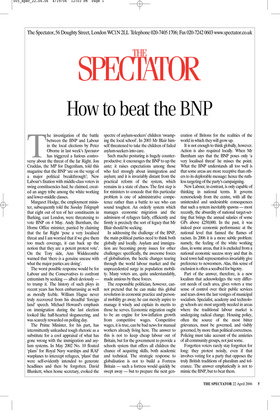How to beat the BNP
The investigation of the battle between the BNP and Labour in the local elections by Peter Oborne in last week’s Spectator has triggered a furious controversy about the threat of the far Right. Jon Cruddas, the MP for Dagenham, told this magazine that the BNP ‘are on the verge of a major political breakthrough’; New Labour’s fixation with middle-class voters in swing constituencies had, he claimed, created an angry tribe among the white working and lower-middle classes.
Margaret Hodge, the employment minister, subsequently told the Sunday Telegraph that eight out of ten of her constituents in Barking, east London, were threatening to vote BNP on 4 May. Andy Burnham, the Home Office minister, parried by claiming that the far Right ‘pose a very localised threat and I am worried that if we give them too much coverage, it can back up the notion that they are a potent protest vote’. On the Tory side, Ann Widdecombe warned that ‘there is a genuine unease with what the major parties are doing’.
The worst possible response would be for Labour and the Conservatives to confront extremism by seeking — albeit deviously to trump it. The history of such ploys in recent years has been embarrassing as well as morally feeble. William Hague never truly recovered from his dreadful ‘foreign land’ speech. Michael Howard’s emphasis on immigration during the last election looked like half-hearted sloganeering, and was scarcely rewarded on polling day.
The Prime Minister, for his part, has intermittently unleashed tough rhetoric as a substitute for a cool appraisal of what has gone wrong with the immigration and asylum systems. In May 2002 No. 10 floated ‘plans’ for Royal Navy warships and RAF warplanes to intercept refugees, ‘plans’ that were self-evidently intended to generate headlines and then be forgotten. David Blunkett, when home secretary, evoked the spectre of asylum-seekers’ children ‘swamping the local school’. In 2003 Mr Blair himself threatened to take the children of failed asylum-seekers into care.
Such macho posturing is hugely counterproductive: it encourages the BNP to up the ante; it raises expectations among those who feel strongly about immigration and asylum; and it is invariably distant from the practical reform of the system, which remains in a state of chaos. The first step is for ministers to concede that this particular problem is one of administrative competence rather than a battle to see who can sound toughest. An orderly system which manages economic migration and the admission of refugees fairly, efficiently and firmly is precisely the sort of legacy that Mr Blair should be seeking.
In addressing the challenge of the BNP, the main political parties need to think both globally and locally. Asylum and immigration are becoming proxy issues for other challenges: specifically, the awesome forces of globalisation, the hectic changes tearing through the world labour market and the unprecedented surge in population mobility. Many voters are, quite understandably, made anxious by these forces.
The responsible politician, however, cannot pretend that he can make this global revolution in economic practice and personal mobility go away; he can merely aspire to manage it wisely and explain its merits to those he serves. Economic migration ought to be an engine for low-inflation growth from competitive wages. Competitive wages, it is true, can be bad news for manual workers already living here. The answer to this is not to keep cheap labour out of Britain, but for the government to provide a schools system that offers all children the chance of acquiring skills, both academic and technical. The strategic response to globalisation is not to build a Fortress Britain — such a fortress would quickly be swept away — but to prepare the next gen eration of Britons for the realities of the world in which they will grow up.
It is not enough to think globally, however. Action is also required locally. When Mr Burnham says that the BNP poses only ‘a very localised threat’ he misses the point. What the BNP understands all too well is that some areas are more receptive than others to its deplorable message: hence the ruthless targeting of the party’s campaigning.
New Labour, in contrast, is only capable of thinking in national terms. It governs remorselessly from the centre, with all the unintended and undesirable consequences that such a system inevitably spawns — most recently, the absurdity of national target-setting that brings the annual salaries of some GPs above £250,000. In the past, it was indeed poor economic performance at the national level that fanned the flames of racism. In 2006 it is a more subtle problem: namely, the feeling of the white working class, in some areas, that it is excluded from a national economic success story and that its local town hall representatives invariably give preference to newcomers. Alas, this sense of exclusion is often a seedbed for bigotry.
Part of the answer, therefore, is a new localism that acknowledges the very different needs of each area, gives voters a true sense of control over their public services and tears down the last vestiges of municipal socialism. Specialist, academy and technology schools are most urgently needed in areas where the traditional labour market is undergoing radical change. Housing policy, often the source of the most bitter grievances, must be governed, and visibly governed, by more than political correctness. Policing must take account of the anxieties of all community groups, not just some.
Forgotten voters rarely stay forgotten for long: they protest noisily, even if that involves voting for a party that opposes the truly British traditions of pluralism and tolerance. The answer emphatically is not to mimic the BNP, but to beat them.


































































 Previous page
Previous page